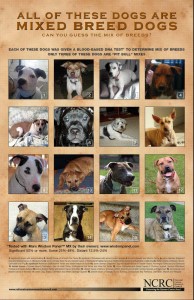What is Breed-Specific Legislation (BSL)?
BSL, also known as breed-discriminatory legislation (BDL), bans or restricts certain types of dogs based on their appearance because they are perceived as “dangerous” breeds or types of dogs.
A breed ban usually requires that all dogs of a certain appearance (”targeted breed”) be removed from the area where the BSL has been implemented.
Breed-specific restrictions may require an owner of a targeted breed do any of the following or more, depending on how the law is written:
- Muzzle the dog in public
- Spay or neuter the dog
- Keep the dog on a leash of specific length or material
- Purchase liability insurance of a certain amount
- Place signs on the outside of the residence where the dog lives
Problems with BSL
BSL has been proven ineffective in reducing the number of dog bites in areas where BSL is enacted.
- The Netherlands (Ban on “pit bulls” since 1993)—Dog bites continued to rise after a breed ban was enacted. The ban was repealed in 2008.
- United Kingdom (Ban on four types of dogs since 1997)—Dog bites increased by 50% between 1997 and 2007, and a number of fatalities involved non-banned breeds.
- Denver, CO (Ban on “pit bulls” since 1989)—“Between 1995 and 2006, Denver had almost six times as many dog-related hospitalizations compared to Boulder, even though Denver’s population is less than twice that of Boulder.” Boulder does not have BSL.
- Prince George’s Co., MD (Ban on “pit bulls” since 1996)—A task force found that “the public safety benefit is unmeasurable.”
- Province of Ontario (Ban on pit bull type dogs since 2005) – The Toronto Humane Society noted in 2014 that the only thing that changed were the breeds of the dogs involved: Restricting breed ownership has not reduced the incidence of dog bites. A survey of reported dog bite rates in 36 Canadian municipalities found no difference between jurisdictions with BSL and those without. Likewise, a 2010 Toronto Humane Society survey found no change in dog bites in Ontario in the years before and after Ontario’s BSL.
- Sioux City, Iowa (complete ban on pit bulls in 2008) – In 2007, the year before the breed ban, 110 dog bites were reported within the county. In 2015, there were 137. The severity of the bites overall did not change: Siouxland District Health, receives reports from the city agencies, as well as the Woodbury County Sheriff and other entities and follows up when the bite causes a break in the skin. In the agency’s reports, a large percentage of the bites reported each year are listed as coming from “unknown” breeds. Breed designations are listed as they are reported to the agency.
BSL Has Proven Very Expensive to Implement and Enforce.
- Prince George, MD—In the fiscal year 2001-2002, expenditures due to pit bull confiscations totaled $560,000. Income from pit bull registrations during that same period totaled only $35,000.
- A BSL Cost Calculator developed by Best Friends estimates that BSL in Indianapolis would cost the city over $1million per year to enforce.
- Find how much it would cost your city, county or town, and how many pet dogs would be impacted, if public officials were to implement and enforce an ineffective breed restriction or regulation policy by entering your city and state into this breed ban calculator. In addition, you can also access talking points to discuss this important animal welfare issue with your legislators.
- The U.K.’s Dangerous Dog Act is estimated to have cost well over $14 million to enforce between the years 1991 and 1996 (no more recent numbers are available).
- The Act has come under fire recently as dog bites (committed by non-targeted dogs) rise despite the ban.
- In 2001, a Baltimore, Maryland, auditor estimated it would cost $750,000 to enforce a breed-specific ban.
- Citizens file lawsuits against municipalities with BSL, alleging unwarranted discrimination or breed mis-identification.
- Owners of targeted breeds feel that BSL violates the Fourteenth Amendment of the U.S. Constitution
- Dog owners dispute the breed designation that an animal control officer or shelter worker has placed on their dog
- A municipality’s breed-specific legislation contradicts state law
- Breed-specific legislation violates the federal Americans with Disabilities Act
- Lawsuits can cost taxpayers hundreds of thousands of dollars and place a heavy burden on both the court system and animal control departments.
BSL Requires Identification of a Dog’s Breed, Which is Extremely Difficult
- In 2007, only an estimated 2% of dogs were registered with a kennel club. The rest had undocumented parentage.
- Animal Control Officers and Veterinarians are not trained to identify breeds.
- Many places with BSL use a checklist of characteristics which are subjective (head is medium length, neck is muscular).
- Many owners have successfully challenged the breed identification of their dog.
Can You Identify a “Pit Bull” Mix?
Only three of these dogs have (some) “pit bull” DNA, yet most of these dogs might be visually classified as “pit bulls” and subject to BSL.


BSL Punishes Innocent Dogs
- It’s estimated that there are 5 million “pit bull” type dogs in the United States—the vast majority of which are well socialized, great pets.
- Ironically, there are a number of cases of banned dogs being spirited to freedom only to become star performers in public safety fields. For instance, pit bull Neville was rescued from Ontario after the Canadian province passed a pit bull ban in 2005. Neville is now a K9 for the Washington State Police; he protects the public daily by sniffing for bombs on the ferry system. By banning pit bulls, Ontario lost at least one invaluable dog that now saves countless lives on a regular basis.
BSL Ignores the True Causes of Dog Bites and Attacks
Dog bite researcher Karen Delise has found three major elements that correlate to almost all fatal dog attacks:
- Function of the dog – Dogs implicated in attacks are often used for guarding, fighting, and breeding
- Owner (mis)management and (lack of) control – Dogs implicated in attacks are often improperly contained or not contained at all; unsupervised; chained; and/or not being watched while interacting with a child
- Reproductive status of the dog – Dogs implicated in attacks are overwhelmingly unlikely to have been spayed or neutered
BSL is Opposed by Many Professional Organizations.
You can find each of the below listed organization’s statements on BSL, here.
- American Dog Owners Association (ADOA)
- American Humane
- American Kennel Club (AKC)
- American Society for the Prevention of Cruelty to Animals (ASPCA)
- American Veterinary Medical Association (AVMA)
- American Working Dog Federation (AWDF)
- Association of Pet Dog Trainers (APDT)
- Humane Society of the United States (HSUS)
- International Association of Animal Behavior Consultants (IAABC)
- International Association of Canine Professionals (IACP)
- National Animal Control Association (NACA)
- National Animal Interest Alliance (NAIA)
- National Association of Dog Obedience Instructors (NADOI)
- Most recently, the Obama Administration who was quoted as saying:
- “We don’t support breed-specific legislation — research shows that bans on certain types of dogs are largely ineffective and often a waste of public resources…As an alternative to breed-specific policies, the CDC recommends a community-based approach to prevent dog bites. And ultimately, we think that’s a much more promising way to build stronger communities of pets and pet owners.”
Effective Alternatives to BSL
Responsible dog ownership is the most effective way to reduce the number of dog bites and attacks. To encourage responsible ownership, legislation should focus on
- Dangerous dog ordinances that do not specify breed but focus on the behavior of the animal
- Owner regulations that cover tethering, chaining, loose dogs, and standards of care
- Calgary, in the Canadian province of Alberta, is a shining example of what does work: Calgary, saw a five-fold reduction over 20 years – from 10 bites per 10,000 people in 1986 to two in 2006. Rather than banning breeds, Calgary uses strong licensing and enforcement plus dog safety public education campaigns.
Additional programs that can help reduce dog bites:
- Low or no-cost spay/neuter services
- Abuse prevention
- Community dog safety training
BSL in Texas
LOVE-A-BULL is Texas-based and the majority of its members live in Texas. For that reason, it is important for LOVE-A-BULL members to know that Texas state law prohibits breed-specific legislation.
- 822.047. LOCAL REGULATION OF DANGEROUS DOGS. A county or municipality may place additional requirements or restrictions on dangerous dogs if the requirements or restrictions:
(1) are not specific to one breed or several breeds of dogs; and
(2) are more stringent than restrictions provided by this subchapter.
BSL on the Decline
In May of 2016, Arizona Governor, Doug Ducey, made Arizona the 20th state to enact anti-BSL laws. As research continues to prove time and again that BSL is not only ineffective, costly and harms innocent families by taking away or restricting their family pet, LOVE-A-BULL is elated to see a huge shift in the legislative approach to public concern over dog bites and community safety. As of 2016, approximately 20 states maintain some sort of anti-BSL legislation. The nation as a whole has begun to embrace the common thread with dog bites, which is preventative actions and education on responsible ownership of all dogs. For information on those states with anti-BSL policies, please view the following document from the Animal Legal and Historical Center. LOVE-A-BULL believes that the wane of BSL certainly leads the country in the right direction, but we also believe that pit bull-type dogs will continue to need support until they are seen by everyone as individual dogs, that are just that…dogs.

